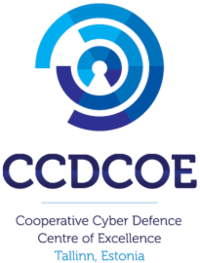Cooperative Cyber Defence Centre of Excellence
| NATO küberkaitsekoostöö keskus NATO Cooperative Cyber Defence Centre of Excellence | |
|---|---|
| Located in Signal battalion base Tallinn, Estonia | |
 | |
| Coordinates | 59°25′23.69″N 24°46′3.26″E / 59.4232472°N 24.7675722°ECoordinates: 59°25′23.69″N 24°46′3.26″E / 59.4232472°N 24.7675722°E |
| Type | NATO Centre of Excellence |
| Site information | |
| Controlled by | NATO CCD COE Steering Committee |
| Website | ccdcoe.org |
| Site history | |
| Built | 2008 |
NATO CCD COE, officially the NATO Cooperative Cyber Defence Centre of Excellence (Estonian: K5 or NATO küberkaitsekoostöö keskus) is one of NATO Centres of Excellence, located in Tallinn, Estonia. The Centre was established on 14 May 2008, it received full accreditation by NATO and attained the status of International Military Organisation on 28 October 2008. NATO Cooperative Cyber Defence Centre of Excellence is an International Military Organisation with a mission to enhance the capability, cooperation and information sharing among NATO, its member nations and partners in cyber defence by virtue of education, research and development, lessons learned and consultation.
History
In 2003, prior to the country’s official accession to NATO, Estonia proposed the creation of a Centre of Excellence. The 2006 Riga summit listed possible cyber attacks among the asymmetric threats to the common security and acknowledged the need for programs to protect information systems over the long term. The cyber attacks on Estonia in 2007 highlighted for the first time the potential vulnerability of any NATO countries, their institutions and societies, and even NATO itself to disruption or penetration of their information and communications systems.
Estonia’s proposals for a NATO cyber excellence center received strong support from the alliance’s Secretary-General "Jaap" de Hoop Scheffer. NATO completed an assessment of the situation, partly in light of Estonia’s experience, in April 2007, and approved a NATO policy on cyber defence in January 2008. NATO’s summit communiqué in Bucharest in April announced NATO’s readiness to "provide a capability to assist allied nations, upon request, to counter a cyber attack".
| “ | The need for a cyber-defence centre to be opened today is compelling. It will help NATO defy and successfully counter the threats in this area. | ” | |
| — General James Mattis in Brussels May 14 2008.[1] | |||
Overview
The Cyber Defence Center in Tallinn is one of 21 accredited[2] Centres of Excellence (COEs), for training on technically sophisticated aspects of NATO operations. It is being funded nationally and multi-nationally as these centers are closely linked with Allied Command Transformation and promote the alliance-approved transformation goals.
The main agenda of the facility is to:
- improve cyber defence interoperability within the NATO Network Enabled Capability (NNEC) environment,
- design the doctrine and concept development and their validation,
- enhance information security and cyber defence education, awareness, and training,
- provide cyber defence support for experimentation (including on-site) for experimentation,
- analyze the legal aspects of cyber defence.
The centre has also other responsibilities which include:
- contribution to development of Cyber Defence Center practices and standards with NATO, PfP, NATO candidates and non-NATO nations,
- contribution to development of NATO security policies related to cyber defence its definition of scope and responsibility of military in cyber defence,
- carrying out cyber defence-focused training, awareness campaigns, workshops, and courses,
- developing and conducting cyber defence-focused exercises and its ability to provide CD exercise support,
- providing cyber defence SMEs to NATO and its ability in cyber defence testing and validating.
Current status
Currently, 16 Sponsoring Nations have joined the Centre:[3]
 Czech Republic
Czech Republic Estonia
Estonia Finland
Finland France
France Germany
Germany Greece
Greece Hungary
Hungary Italy
Italy Latvia
Latvia Lithuania
Lithuania Netherlands
Netherlands Poland
Poland Slovakia
Slovakia Spain
Spain Turkey
Turkey United States
United States United Kingdom
United Kingdom
In addition, the Centre has one contributing Participant:
NATO CCD COE's Founding Nations are Estonia, Germany, Italy, Latvia, Lithuania, Slovakia and Spain.[4] Hungary, Poland, the United States and the Netherlands joined in the following years.[5][6][7] In 2014 France, United Kingdom, Czech Republic, and Austria as the first non-Nato country joined the centre.[8] In November 2015 Finland, Greece and Turkey joined.[9]
Membership at the NATO CCD COE is open to all NATO nations. NATO CCD COE can also establish cooperative relations with non-NATO nations, universities, research institutions, and businesses as Contributing Participants.
See also
- NATO Centres of Excellence
- ENISA
- Cyber-warfare
- Electronic warfare
- Proactive Cyber Defence
- National Cyberdefence Centre
- Tallinn Manual
Notes and references
- ↑ NATO launches cyber defence centre in Estonia
- ↑ (15 Dec 2010). NATO Transformation Network - Centres of Excellence
- ↑ NATO opens the CCDCOE in Tallinn
- ↑ NATO A-Z Centres of Excellence
- ↑ Hungary Joins the Centre
- ↑ Poland and USA join the Centre
- ↑ The Netherlands joins the Centre
- ↑ Einmann, Andres (3 June 2014). "Prantsusmaa, Suurbritannia ja Tšehhi saavad NATO küberkaitsekeskuse liikmeteks" (in Estonian). Postimees. Retrieved 2014-06-03.
- ↑ "NATO küberkaitsekeskusega liitusid Kreeka, Türgi ja Soome" (in Estonian). Postimees. 3 November 2015. Retrieved 2015-11-04.
External links
- NATO Cooperative Cyber Defence Centre of Excellence (CCDCOE) Official Webpage
- The Cooperative Cyber Defence (CCD) COE